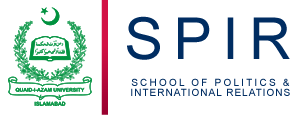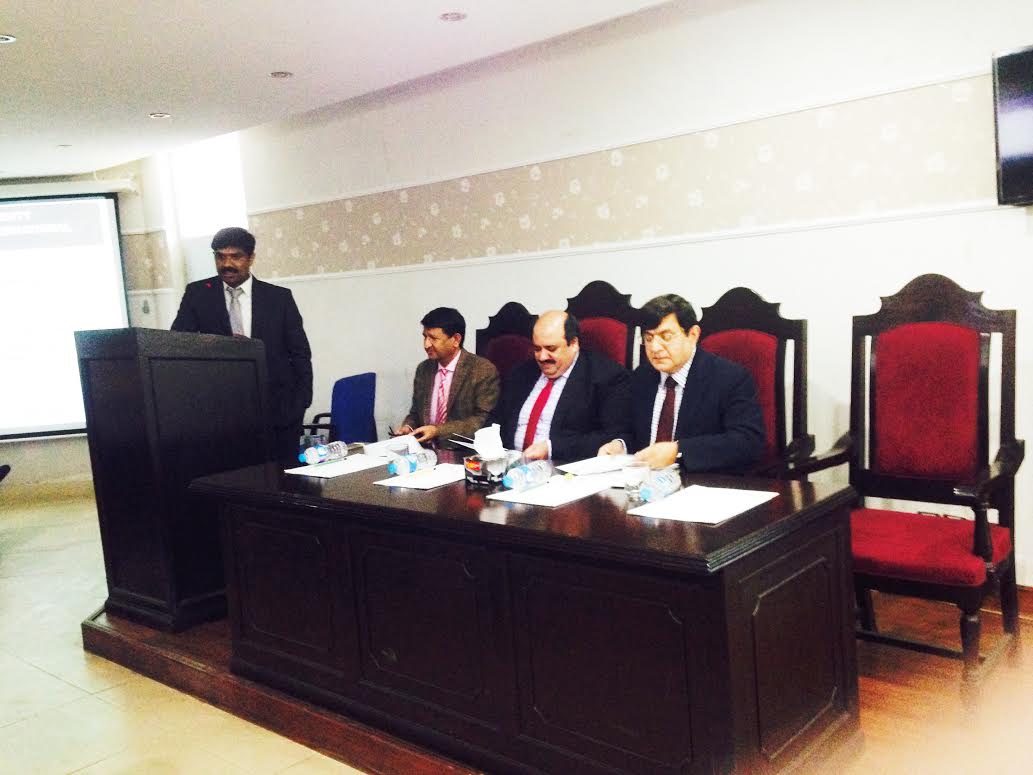One Day International Conference on “Nuclear Taboo and Norms in the Second Nuclear Age: Views from Pakistan”
School of Politics and International Relations (SPIR), Quaid-i-Azam University Islamabad organized one day international conference on “Nuclear Taboo and Norms in the Second Nuclear Age: Views from Pakistan” on March 2, 2016. Dr. Ishtiaq Ahmed, Director SPIR initiated the proceedings of the conference. He deliberated that how Pakistan has transformed from a reluctant nuclear state to a responsible nuclear power operating rationally. He further argued the fact that Pakistan didn’t commit original sin of nuclearizing the South Asian region, yet it has been victimized by global powers through long standing discrimination, he argued.
Brig. (Retd.) Feroz Hassan Khan of Naval Post Graduate School, Monterey, United States while chairing the first session of the conference, deliberated on conceptual frameworks and contours of the terms “Nuclear Taboo” and “Second Nuclear Age”. He termed Nuclear Taboo as an unwritten and un-codified prohibitory norm against nuclear use. He emphasized upon the development of an Islamic discourse about the Nuclear Ethics.
Dr. Zafar Nawaz Jaspal, Associate Professor SPIR, and the convener of the conference, highlighted the glaring dissimilarities between cold war power politics and “Second Nuclear Age”. Cold war experience provided good vocabulary for South Asia but the realities on ground are extremely different between two cases. During cold war, superpowers had no geographical proximity. Neither, the relation between the two was asymmetrical in nature. Hence, the existing knowledge and precedents about Nuclear Taboo, based on cold war experiences cannot be literally implemented in South Asia. Moreover, duplicitous behavior of global powers i.e. considering India a like-minded state, while discouraging and discriminating Pakistan at the same time has contributed regressively in South Asian theatre. He added, every nuclear weapon state has been modernizing its nuclear arsenal. Conversely, nuclear non-proliferation regime has gradually weakened, especially after the NSG granting of waiver to India.
Ms Dianna Wueger, Faculty Associate for Research Center on Contemporary Conflict, United States while presenting her paper in the 1st session of the conference, explained the historical evolution of the Nuclear Taboo between superpowers during the cold war. She explained how combination of social forces, rediscovery of moral values after Vietnam War, and political elite played their role in the establishment of the Nuclear Taboos and norms of non-use of nuclear arsenals.
Dr. Rizwana Abbasi, Assistant Professor, Department of Defense and Strategic Studies, National Defense University, while presenting her paper, argued that it is the amalgamation of material and non-material factors, which leads to Nuclear Taboo. The idea of no victory in nuclear domain and cold war environment based on bipolar order helped to achieve efficiency and efficacy in establishing Nuclear Taboo. President Kennedy played an anchor role by introducing conventional alternatives against the use of nuclear weapons, the element which is drastically missing in South Asia. The change in Indian mindset and regional strategic environment is essential for any change in Pakistan’s behavior about its threat perceptions.
Mr Qamar Cheema from Department of International Relations, National University of Modern Languages, Islamabad, discussed the role of public opinion, institutions and political leadership in discourse construction. The strategic stalemate leads to deterrence stability among belligerent states. It is the regional environment which forced Pakistan to build nuclear weapons. Pakistan has always talked about nuclear restraint regime in South Asian region, the bid which has been turned down by India more than often.
Dr. Muhammad Nadeem Mirza, Assistant Professor, SPIR QAU, while presenting his paper in the 2nd session of the conference, gave a different dimension to the discussion by theorizing the whole phenomenon while using Rational Theory of War and Prisoner’s Dilemma Model. He elaborated the Nuclear Taboo as normative in nature, which is about non-use of nuclear weapons because of their potential for causing unacceptable destruction. The non-use of nuclear weapons has become an institution because it has turned out to be a ‘routinized pattern of states behavior’. Why the belligerent states should adhere to these institutions was responded as these institutions help avoiding mutual assured destruction. The element of incentive for winner is missing in the case of hypothetical nuclear war, which is the principle rationale behind states policy of pursuing the norm of non-use of nuclear weapons.
Ms. Samra Naz, a PhD candidate at the SPIR QAU talked about social perspective on Nuclear Taboo during her address to 2nd session of the conference. She particularly discussed the contribution made by the societal movements to the development of the concept of the Nuclear Taboo.
Both the sessions were followed by insightful Q/A sessions. Dr. Zafar Nawaz Jaspal concluded the conference by extending profound gratitude and thanks to the visiting scholars, indigenous faculty members and student participants.

